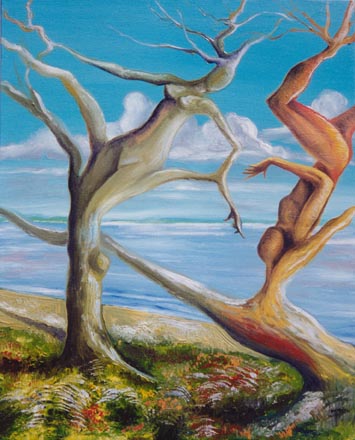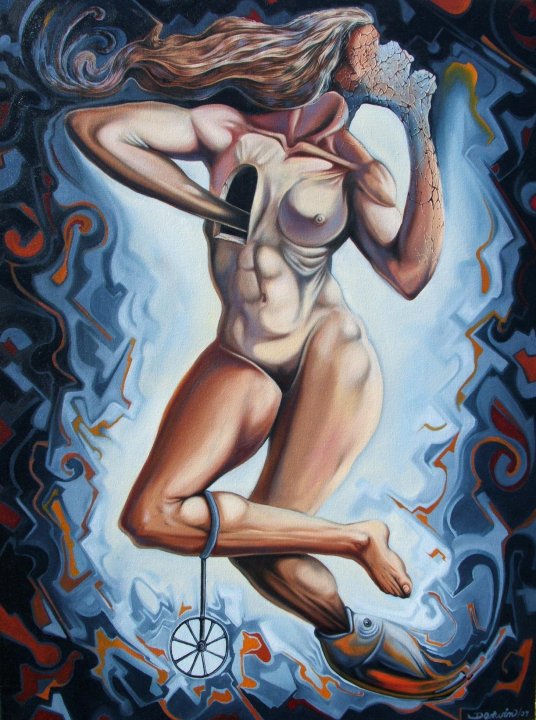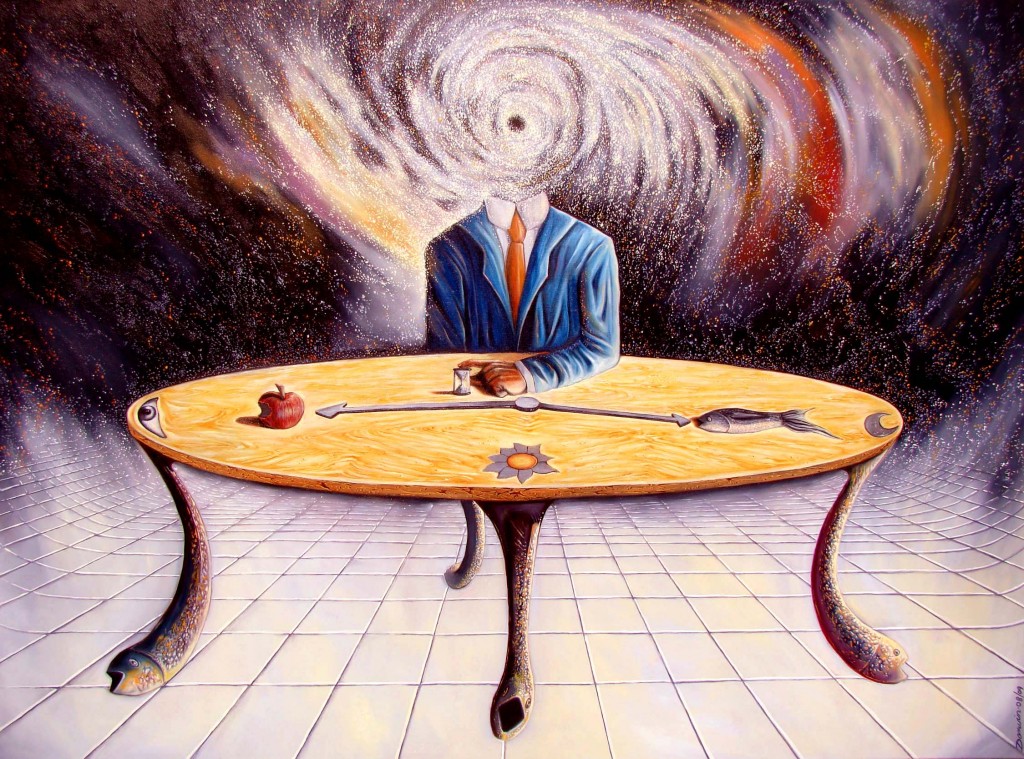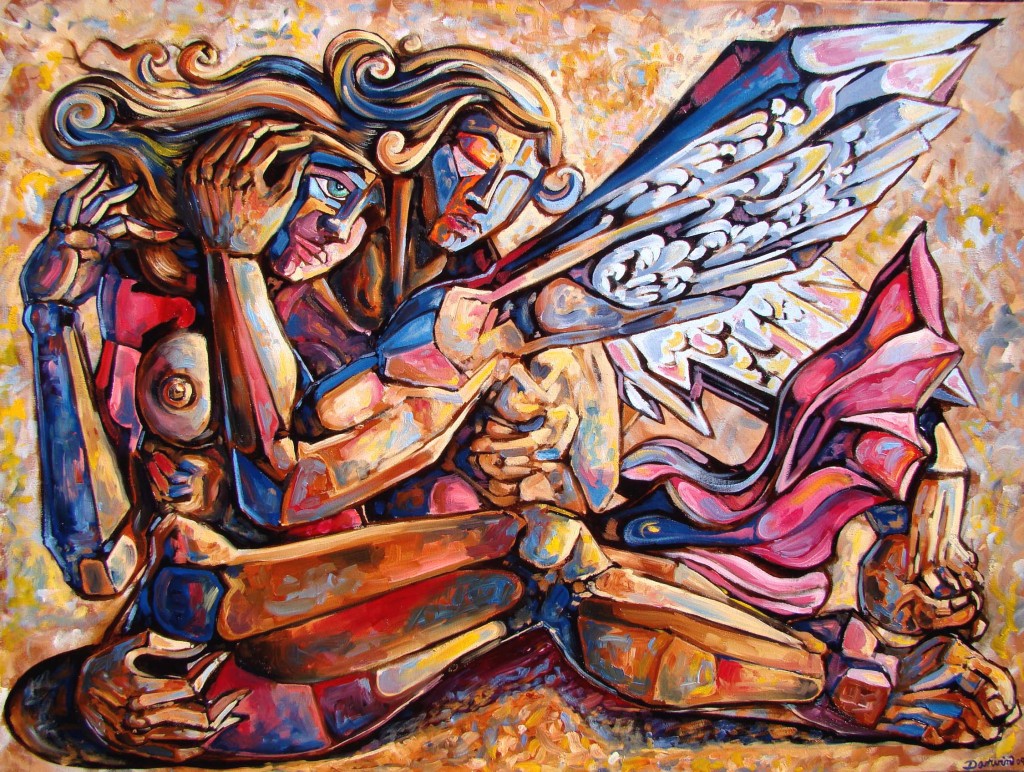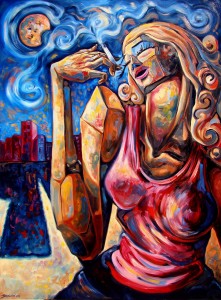
So there was no “Oh, darling, I hunger for your touch” moment. It was not like that. We were not like that. We were quiet and reserved, the kind of couple who fades into the pavement, blends in with the blinds and the placemats, the kind of people you would walk by without noticing. We were like streetlights. We looked like we belonged.
We were supernormal, one dog, two kids, a minivan, a mortgage that we would have paid off in time. Then, Connor died. There was no weird cover-up/scandal with a bank. Just plastic cups and hospital straws and food that didn’t smell good enough to eat. And then. A funeral. Eternal rest grant unto him Oh God, and may perpetual light shine upon him.
Connor had life insurance and a will and all the things that people are supposed to have but don’t. A friend of mine from college with her long hair, coat down to her feet and boots up to her knees saying, “At least you’re taken care of, Gillie.”
“Yeah, right.” Because that was what I cared about. In the end. Money. I cared about that as much as folding the laundry and cooking dinner, which was why Connor did those things. Or had done those things. Before.
What there was was a quiet breeze on a day when there was no wind. What there was was a bright spot of sun for only me to bask in. What there was was a still, small voice.
We had no medium. It was just presence where there had been absence and then me saying to Jonathan and Gemma: I think Dad was with me.
Gemma at the kitchen counter looking up from painting her nails, the smell of her polish polluting the air, “Sure, Mom.” Gemma, 16 going on 30, talking to me as one talks to an Alzheimer patient. Jonathan, 13, standing in the middle of the kitchen, believing, hopeful. “You think he’ll visit me, Mom?”
I am reading the directions for the frozen lasagna off the package: Preheat oven to 450. It’s the kind of lasagna that comes in the orange box with a black plastic tray. The kind that all you have to do is turn the oven on and wait and wait.
Gemma, who is dark eyeliner and prominent silver crosses, saying, “Pizza would be faster and probably cheaper.”
“Not in this town.”
“Mom, this is the only town we’ve ever lived in.”
Gemma has a tendency to act like her life history is the only one that matters.
I am not looking to argue. “Okay, right.”
We move then. Like chess players. Gemma goes first. Me second. Jonathan last. Jonathan wears a polo shirt, Gemma mesh stockings. They look like they come from different reality shows. We shuffle into the living room, sit apart.
Jonathan, crosses his legs, sits up straight, and says to his sister from the rocking chair: “I bet Dad won’t visit you.”
Gemma doesn’t respond. Jonathan opens his mouth to wet his braces. He looks like a young Anthony Michael Hall. Gemma looks like a girl in a music video. We all sit tense. The flat screen TV we wanted so badly is turned off and covered with plastic. The stand beneath it has a layer of dust so thick that you could fill the vacuum canister with it. I think I see a cobweb, a spider.
Gemma, from the couch, with perhaps a note of excitement in her voice, saying, “This place would be a good room for ghosts.” She seems to be implying more.
I rise from the recliner, stand straight up. “I thought that we could use some time to talk away from the distractions.” That’s why I covered the TV, put the radio away.
“It’s cool,” Jonathan says.
“A little less conversation,” Gemma responds. Her nails have dried now, so she, too rises. It’s okay to reference the dead if they happen to play music.
Jonathan and I have nothing more to add. So we exit how we entered—Gemma first, Jonathan last. I serve as a buffer between them.
~
Four weeks before, I was lying in bed, sleeping late. The kids had gone to school. I should have gone to work, but didn’t. I knew that Hansel had been tolerant. Beyond tolerant. I waited for him to say: “Gillian, you are no longer needed here. But, so far, that had not happened. I think that part of me wanted to know how far his sympathy would go. The other workers talked. “Gillian was late again,” but Hansel, his wild hair flying high, straightened his tie and defended me, saying, “She just lost her husband. What would you do if you were in her place?” I knew, too, that part of his interest was more than friendly. It came from an attraction. There is something sexual in the grieving widow, the damsel in distress. Something that makes a decent man think, Lord, we have to help her.
I wrapped the sheet around my naked toes, phoned Hansel. “I’m going to be late,” I said.
He sighed. “Gillian. Is there reason?” He meant a valid reason.
The reason was I couldn’t bring myself to get up, to care enough. This was what I told him.
“You should see a doctor.”
It was on the train to work that I first saw Connor. Well, really felt him. That wind. The pages of my book blown open.
I turned to the passenger behind me. “Did you feel that?”
The man, a handsome black man with iPod buds in his ears, shook his head.
How could I merit my own wind in a closed in space? Was there an open window somewhere?
My thoughts didn’t go right to Connor at first.
It was later. Street chalk on the city sidewalks in blue and pink and orange. Let it go. Connor used to always say that. At first, I thought coincidence.
It was later. In the lunchroom cafeteria. The special that day at first read: Peace and Serenity. And then, a moment after, it didn’t. It was back to saying black bean soup and corn muffin.
I liked the other special better, so I ordered it.
“I’d like some peace and serenity,” I said to the woman behind the counter, whose long silver hair was braided and pulled up into a hairnet.
“What?” she asked.
“I’ll have the special.”
Hansel joined me for lunch. He didn’t ask if he could; he just did. He set his metal tray down across from me. I felt like we were prisoners. Or I was the prisoner. He was the warden, the parole officer, the one sent to make sure I made it through okay.
“Gillian, I’m going to have to fire you, if you don’t. . . ”
He tried to continue, but I stopped him. As I spoke, he sipped water from a red plastic cup.
“I know, and the problem is.”
This is the part that I can’t really explain at all. It was like. Time stopped, and everyone froze. I saw no one. But I felt. . .different.
I couldn’t bring myself to say what I would have said: and the problem is I just don’t care.
I felt tears running down my cheeks. “I’m sorry.”
“You’ve not cried since the funeral.”
“No.” I ate my soup with a spoon.
“This could be progress,” he said in a way that suggested interest.
I nodded. “I’ll try, okay. I’ll really try.”
~
For the next two weeks, I came in on time for work. I walked dutifully through the revolving doors and metal detectors. While there, I did what I was supposed to do. Hansel said he was glad to see the change in me.
“Before you were. Headed for promotion. And then.”
We stood in the lobby. With its hard floors and high ceilings, it felt like a museum, and I couldn’t help but notice how often Hansel found time to find me.
“I don’t want to talk about before.”
“I thought we agreed. Talking is good.”
“Sometimes. And sometimes it’s not.”
His hand on my shoulder. A touch of concern. I should mind more. Shouldn’t I? After all, Connor has just died. How long’s it been? An hour, a day, six months, a year. It’s been a year.
Wow. That long. So long and not long at all. I felt nauseous, a wave of queasiness in my stomach. I excused myself to the bathroom. On the mirror, someone has written with a finger or what looked like a finger: Let it go.
“Let what go?” I said aloud.
A woman in the stall closest to the door walked to the sink and gave me a strange look as she applied her red, red lipstick. Pink would be better, I thought. Red made her look too pale.
“I’m just talking on my Bluetooth,” I said. She acted like she didn’t believe me.
I waited till she has gone, and then five minutes more.
Another word came then. A series of them. Death. Let it go, Gillian. Live.
My office is ten floors up. I climbed the stairs instead of riding up. Hansel was waiting by my cube. A bit frantic, he questioned, “Where have you been? What happened? Is everything okay?”
I nodded.
“I am okay. Or I’m going to be okay. After now.” I looked at my calendar. The things I said I’d do yesterday, I did. It was a small step but still a step. I waited for him to go, but instead, he said, “We’re having lunch today.”
We’d had lunch together every day for the last two weeks, but, somehow it seemed an accident. We were just there together at the same time.
Then, he’d made a move to make it intentional. A step beyond, a step toward something else. Now, it was my turn. I had to let him know if we could move forward. Beyond accident to intention. He licked his lips. He waited. With his wild hair and square glasses, he looked nothing like Connor. Connor was wavy hair and working outside. Hansel is inside, office, business, business, business. Hansel waited. And yet, they are both compassion.
“Okay,” I said. “We’ll have lunch.”
~
The night I talk to the kids, I fall asleep on the train home and dream of Connor, and then I wake and think about my lunch with Hansel. It was just normal, except. There was this one moment where we both reached for the ketchup and his hand brushed my hand. An accident. But neither of us moved the hand away. Instead, we held them there. And then he said my name. A moment later, we were back to wherever we had been before, but it was not quite the same. Something had turned. That night, after Gemma has gone to practice guitar at a boy’s, a friend’s house, a boy who could be more than a friend, she hasn’t told me yet, but she will, Jonathan dries the dishes with a pink towel while I wash, and he asks me to tell him how I knew that it was really Dad, so I tell him the truth, which is simply this: Because I felt better.
Lori D’Angelo earned her MFA from WVU in 2009, and her work has appeared in various literary journals including Word Riot, Drunken Boat, Stirring, and Literary Mama.
Read our interview with Lori here.
